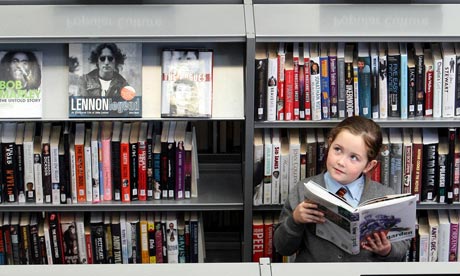What libraries do for us – and me
Libraries' huge contribution to children's literacy is threatened by swingeing cuts across the country. Where is the outrage?

'Libraries are an equaliser, providing access to books, librarians and a safe environment for all.' Photograph: Paul Faith/PA
'A city without a library is like a graveyard." Those were the words thatMalala Yousafzai, the inspirational Pakistani women's rights activist, used to open Birmingham's new £189m library this month. A poignant statement, considering the continuing tide of public library closures announced recently.
To paraphrase a famous scene from Monty Python's Life of Brian, what do libraries do for us? Well, they introduce many into the world of literacy and learning and help to make it a lifelong habit; they equalise; they teach empathy and help us to learn about each other; they preserve our cultural heritage; they protect our right to know and to learn; they build communities; they strengthen and advance us as a nation; they empower us as individuals.
I myself wouldn't have my lifelong passion for literature, would never have become a writer and certainly wouldn't be the current children's laureate if it hadn't been for visiting my local library as a child.
While I appreciate that in these austere times all local authorities are seeking to make savings, there is surely a strong argument for library services, and in particular children's library services, to be ringfenced against such cuts. Indeed, the 1964 Libraries Act states that every authority must provide a "comprehensive and efficient" library service, and that the government's duty is to investigate when there are serious complaints that this is not the case. Yet this government has not once seen fit to intervene, not even in Gloucestershire, where nearly half the libraries were scheduled for closure, and Herefordshire, where swingeing cuts to the public library service were initially proposed.
Recent figures from Public Libraries News show that nearly 105 UK libraries have either been closed or left local authority control since April 2012.
Last week Sheffield's city council announced plans to keep only 12 of its 28 libraries open, unless community groups come forward to run them. In the past few weeks Moray council has voted to close seven out of 15 branches. Sefton libraries are due to close a number of their branches. Not to mention the Lincolnshire libraries' cuts that have seen further public outcry, with plans proposed to keep just 15 out of 47 libraries open
In August, when there was a danger of Jane Austen's ring leaving the country, the culture minister Ed Vaizey was quick to intervene with a temporary export bar as the ring is deemed to be a "national treasure" that should be "saved for the nation". I would argue that our public libraries are just as much of a national treasure as Jane Austen's ring and yet I have seen no such outrage from Vaizey at their closure.
In these times of increasing government emphasis on children's reading and their resultant educational attainment, surely the closure of public libraries, reduced book spend, limited opening hours and the compulsory redundancy of librarians have had a direct and negative impact on this aspiration? Only last week the Institute of Education released a study that gave yet more evidence that reading for pleasure between the ages of 10 and 16 improves vocabulary and boosts attainment in spelling, and also maths. Reading was found to be even more important for children's cognitive development at secondary school than the influence of their parents.
Libraries are the best literacy resource we have. For children they provide an equaliser that allows everyone access to books, story-telling sessions, homework clubs; expert librarians who give non-partisan assistance and advice regarding books; and warm and safe environments within which to discover and explore the world of literature. Libraries switch children on to a love of reading, with all the ensuing benefits, and can make them lifelong readers. Without them, literacy may increasingly become the province of the lucky few, rather than the birthright of everyone.
• This article was amended on 23 September 2013. An earlier version said that Medway council had confirmed closure of seven out of 15 branches. Medway has no plans to close any of its 16 libraries. The article also said swingeing cuts to the library service were initially proposed in Hertfordshire. That reference should have been to Herefordshire.